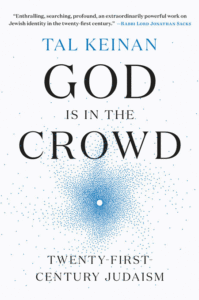Reviewed by NEAL GENDLER
If present trends continue, mainstream Jewry in America is doomed, says Tal Keinan, who’s also pessimistic about Israel.

Keinan, an American born and educated Israeli fighter pilot and successful businessman, proposes a program to counter problems that he diagnoses at length.
“In America, Judaism is insufficiently compelling to the critical mass” needed for survival, Keinan says.
“The only reason most secular Israeli Jews marry other Jews is because that is who they meet,” he says. In America, “at current rates, intermarriage will end American Judaism, in any form we would find recognizable today, in three generations.”
His math shows intermarriage steadily reducing the pool of potential Jewish spouses. He says the black-hat Orthodox are too few, strict and insular to be a solution. An estimated one million Israelis live in America, intermarrying even more than American-born Jews, Keinan says.
Israel’s official rejection of the Judaism of America’s Jewish majority alienates Jews traditionally most supportive of Israel, while young American Jews are losing interest in Israel and in Jewish life and observance, he says.
“Israel is the self-proclaimed nation-state of the Jewish People, but there’s little consensus among Israelis as to what that means.” He says continuing chaotic governance, low incomes, defense burdens and religious rigidity will drive Israelis out.
Unchecked, both trends will evaporate the critical mass the Jewish people needs to survive as Jews, he says.
“Our choice as a community is stark: “Create meaning in Judaism or accept extinction.”
Keinan hopes God is in the Crowd will “open a personal window” for more Jews, affiliated and unaffiliated, to “contemplate the value of their Judaism — to themselves … to their communities and to humanity.”
He hopes to reinvigorate the collective wisdom of the nearly-vanished Diaspora, in which Jews with varying practices, moving across continents for centuries, created a foundation of Jewish fundamentals now in danger of disappearing.
He wants to encourage a large portion of the world Jewish community into debate about its future, reclaiming control of its destiny.
His proposal has three parts. The first, drawing from “wisdom of the crowd” theory dating to 1907, would be creating a “wisdom machine,” a technology platform for gathering and amalgamating ideas about Jewish life and problems.
“The challenge is to offer a model of Judaism compelling enough that the vast majority of Jews, in America and Israel, will embrace it willingly.”
Second is creating a self-funding Jewish World Endowment to provide two American-Israeli Jewish summer camp experiences and two months’ community service, plus a full-tuition undergraduate scholarship. An appendix shows financial calculations.
The third proposal is for Israel: Israelis would elect a government to run the state, and Jews everywhere would elect an Israeli president empowered for matters of Israel’s Jewish character and who Israel accepts as a Jew.
“If Israel is to continue claiming to represent all Jews, and to continue demanding worldwide Jewish support, it must give all Jews representation in the matters that impact them directly,” he says.
He divides Israelis into Territorialists and mutually scornful Theocrats and Secularists. Many Secularists “see religion itself as their enemy,” he says. “Jewish sovereignty has had the perverse effect of turning a very large swath of Jewry against Judaism.”
He says much of Israel is a fourth group: Jews struggling for economic survival, leaving little time for ideology, and “Israeli Arabs, most of whom buy into none of the three visions.” The four groups’ incompatibility is unsustainable long-term, he says.
Keinan chairs the nonprofit Koret Israel Economic Development Funds, making “small business loans and microloans to entrepreneurs in Israel’s periphery,” $400 million so far. The default rate is below 2 percent.
He draws from flying experiences to discuss moral dilemmas of Israel’s defense, often invisible to critical Jews elsewhere.
He suggests slowing “the vicious math behind the decline of American Jewry” by creating a standard agreeable to the majority of the world’s engaged Jews, the ones who’d vote for Israel’s president — perhaps Maimonides’ definition of a Jew, not the “draconian demands of the frequently fickle Israeli Rabbinate.”
To those finding his ideas radical, he invites badly needed debate.
“One obstacle should be clear to all of us: We cannot impose Jewishness on the Jews.” The world no longer does. “Nor can we impose Israel on the Israelis,” he says. “The most productive segments of Israeli society have options.” They can leave. If too many do, Israel will lose the critical mass and quality needed to survive.
***
Neal Gendler is a Minneapolis writer and editor.




















